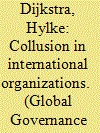| Srl | Item |
| 1 |
ID:
156237


|
|
|
|
|
| Summary/Abstract |
In the theoretical literature on the authority of international secretariats, academics often dichotomize between states and secretariats. Even when they account for the fact that states are often divided, they normally adopt a two-step approach: states first resolve their own differences before they entertain relations with secretariats. This article provides an alternative perspective. It argues that individual or groups of states may collude with like-minded secretariats to achieve outcomes at the expense of other states. Working informally together is beneficial. States can benefit from the rational-legal, delegated, moral, and expert authority of secretariats. States and secretariats can also exchange resources. The article illustrates this perspective through two case studies: the NATO intervention in Libya in 2011 and the European Union's military operation in Chad in 2008.
|
|
|
|
|
|
|
|
|
|
|
|
|
|
|
|
| 2 |
ID:
086436


|
|
|
|
|
| Publication |
2009.
|
| Summary/Abstract |
Analysts usually identify two United Nations, one composed of member states and a second composed of the secretariats. A third UN should also be recognized, composed of actors that are closely associated with the world organization but not formally part of it. This "outside-insider" UN includes nongovernmental organizations, academics, consultants, experts, independent commissions, and other groups of individuals. These informal networks often help to effect shifts in ideas, policies, priorities, and practices that are initially seen as undesirable or problematic by governments and international secretariats.
|
|
|
|
|
|
|
|
|
|
|
|
|
|
|
|